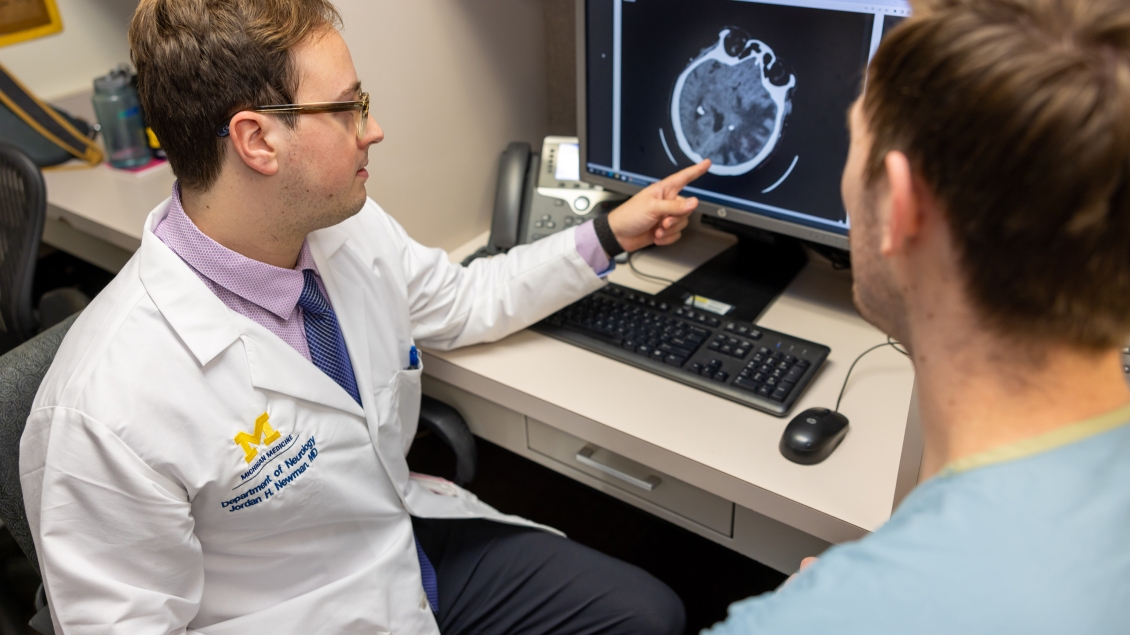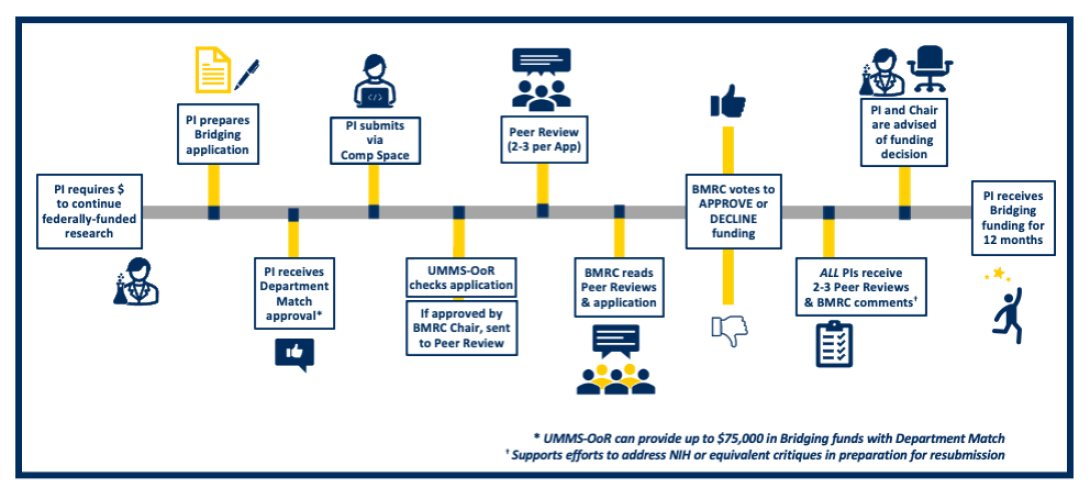
Providing support to established investigators to continue federally-funded biomedical research programs that demonstrate a likelihood of being successfully renewed for federal funding.
The BMRC Bridging Support program provides funding to established investigators to continue federally funded biomedical research programs that demonstrate a likelihood of successfully competing for federal funding. Biomedical research is defined broadly to include basic, clinical, translational, and health services research. Bridging funds are meant to support efforts to address NIH or equivalent grant critiques in preparation for resubmission. Priority is given to established investigators with a high financial need to continue funding their research program.

The program information detailed below is also available as a downloadable document through U-M Dropbox.
Applications are reviewed on a rolling basis, but applications must be received by the BMRC at least three months before you plan to submit your grant application to the sponsor.
All full-time, on-campus instructional, clinical, and research track faculty with primary appointments in the Medical School are eligible to apply.
PLEASE NOTE: Applications from the following are NOT accepted: postdoctoral fellows, projects to be performed while the PI is on sabbatical, visiting or adjunct professors, emeritus faculty, faculty members without evidence of investigative independence, and faculty members whose future work will not continue at the University.
- Applicants must have a prior history of NIH R01 funding.
- Investigators with > $75,000 in discretionary or start-up accounts or ≥ $500,000/year direct costs from all external sponsors are not eligible for Bridging Funding.
- Investigators cannot receive funding in the same 12-month period from more than one of any of the following UMMS programs: BMRC Bridging, Extended Bridging by the Endowment for Basic Sciences (EBS), or Pandemic Research Recovery (PRR)
- Applications must be submitted to the BMRC at least three months before the planned NIH grant submission. This three-month processing period allows for a thorough review by subject matter experts (SMEs), consideration of both the application and SME feedback by the BMRC, and time to use the critiques to strengthen your resubmission.
- Investigators not eligible for BMRC Bridging may be eligible for bridging awards from the Endowment for Basic Sciences (EBS).
Grants eligible for Bridging Funding:
- A contemporary, previously funded NIH R01 with an unsuccessful A0 or A1 competitive renewal attempt that will be resubmitted. The specific aims of the resubmission must be a continuation of the specific aims of the previously awarded R01; Bridge funding is not intended to support new R01 applications/new lines of inquiry. R01-equivalent renewable awards may be considered on a case-by-case basis.
- A project component of a previously funded Program Project or Center grant with an unsuccessful application that will be submitted as an independent R01 A0 application.
- Grants to be bridged must reside in the Medical School.
Grants not eligible for Bridging Funding:
- Non-renewable NIH grants (e.g., R21, R00, K awards)
- Grants funded by Foundations (e.g., American Heart Association)
- Internally awarded pilot grants
- Career Development Awards
- Fellowship Awards
- R03s or grants under $100,000/year
BMRC - Currently up to $150,000 (BMRC bridging funds <$75,000, plus Department's match funds <$75,000) is available to maintain projects for a maximum of 12 months. The funding period cannot overlap with federal grant funding if the grant is ultimately awarded. Awards can start after no-cost extension funds are exhausted and can be paid (within one year) until the start date of the new grant. Unspent bridging funds will be transferred back to the BMRC upon the start date of the new federal award or the end of the 12 months of BMRC funding.
PI's Department Match - An equal amount of matching funds is REQUIRED from the PI's department. These matching funds may include up to 10% of the PI's salary effort and corresponding fringe benefits within the NIH cap.
BMRC Bridging No-Cost Extensions - Requests may be considered but cannot overlap with federal funds. Please contact the BMRC Bridging Support team (bmrcbridging@umich.edu) regarding extension requests before the end date of the bridge award.
Submission of Renewal Application - Application for the renewal NIH R01 must be submitted before the end of bridge funding.
Applications must be submitted online through UMMS Competition Space (login with University of Michigan credentials). Please visit the BMRC Bridging Support competition for complete details about the materials required for the application.
Applications must be received by the BMRC at least three months before you submit the grant to NIH.
BMRC bridging provides funding for grants that have a strong likelihood of receiving federal funding on resubmission. To determine if an application meets this benchmark, applications are reviewed by U-M subject matter experts (SMEs) and these reviews form the basis for discussion and funding decisions by the Biomedical Research Council (BMRC). The SME comments and BMRC comments are intended to help the applicant revise and strengthen their proposal, thereby increasing the likelihood that the application will receive federal funding.
Review Process:
- Two to three content experts and the membership of the BMRC will provide applicants with written feedback on the merits of the proposal and the plan to address NIH reviewer critiques.
- Funding decisions will be made based on the following criteria (in order of priority):
- Financial need: Investigators with substantial available funds will need to provide a strong justification on why additional funds are required. Amounts of other support, internal resources, and start-up funds will be considered.
- Scientific merit of proposal and impact on the field.
- Likelihood that proposed experimental plans will result in a successful grant submission.
- Reviews and funding decisions are completed within 6-8 weeks. Applicants will receive review comments, regardless of funding decision.